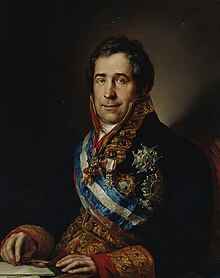Francisco Tadeo Calomarde
Francisco Tadeo Calomarde de Retascón y Arriá (born February 10, 1773 in Villel , Aragon , † June 19, 1842 in Toulouse ) was a Spanish statesman (Minister of Justice 1824-1833) and Duke of Santa Isabel ( Kingdom of the Two Sicilies ).
Life
Calomarde, who came from a poor family, studied law at the University of Zaragoza , became a lawyer and, through the well-calculated engagement with the ugly niece of the royal personal physician Berga, got a job in the Ministry of Justice, but then had to close the marriage by the king by threatening the Galley penalty be forced. Fleeing from French tyranny , Calomarde followed the central junta of Aranjuez , whose boss he was elected, to Seville and then to Cádiz in 1808 . When Ferdinand VII returned to Spain in 1814, Calomarde was one of the first to pay homage to the absolute king in Valencia , for which he was appointed chief official of the Secretaria general de Indias . Because of the acceptance of a considerable sum of money for the award of an American diocese, he was deposed in 1816 and exiled to Toledo and, after secretly returning to Madrid, to Pamplona .
When the constitution was restored in 1820, Calomarde offered himself again to the liberals, but was rejected. He only gained influence when the French invasion of 1823 restored absolutist kingship in Spain. The Duke of El Infantado appointed him secretary to the reign established in Madrid. He was then appointed secretary of the Cámara del real patronato as a supporter of the reaction and in June 1824 was promoted from the king to minister of justice . For eight years now, the most important state business passed through his hands. The favor of the king gave him great power, which he used to uphold absolutism , to suppress strivings for freedom, especially by the secret police, to recall the Jesuits , to restore the monasteries and to ruthlessly persecute the liberals. At the same time, he sought to secure the favor of Ferdinand VII's younger brother, the Infante Don Carlos , in advance, while severely punishing any unsuccessful Carlist uprising.
On March 29, 1830, Ferdinand VII confirmed in a decree the repeal of the Salic law, which only allowed male heirs to the throne, which his father Charles IV of Spain had decided in 1789 , but which was not formally legally valid . His underage daughter Isabella was to succeed him on the throne in the event of his death under the reign of her mother, Queen Maria Christina . Don Carlos was so deprived of his right of succession and did not accept the decision. When the king fell so dangerously ill on September 14, 1832 in his summer palace La Granja that, according to his doctors, he was already dying, Calomarde warned the queen that a civil war threatened if Isabella's accession to the throne were to occur. The frightened queen asked her husband, as soon as he had recovered a little, to withdraw his decree and restore Sali's law. On September 18, Ferdinand VII signed the relevant decree, previously read by Calomarde, in the presence of his wife and the government. But the king recovered and was moved to change his mind again. He dismissed his government, appointed a new one, chaired by Francisco Cea Bermúdez , and on December 31, 1832, annulled his decree of September 18. Calomarde was referred to his property in Aragon and was even arrested three months later, but escaped to France disguised as a Franciscan . Since then he has lived mostly in Orléans under the supervision of the French police and died in Toulouse in 1842.
literature
- Calomarde, Don Francisco Tadeo , in: Meyers Konversations-Lexikon , 4th edition 1885-1892, Vol. 3, pp. 741f. ( online )
| personal data | |
|---|---|
| SURNAME | Calomarde, Francisco Tadeo |
| ALTERNATIVE NAMES | Calomarde de Retascón y Arriá, Francisco Tadeo (full name) |
| BRIEF DESCRIPTION | Spanish statesman |
| DATE OF BIRTH | February 10, 1773 |
| PLACE OF BIRTH | Villel , Aragon |
| DATE OF DEATH | June 19, 1842 |
| Place of death | Toulouse |
